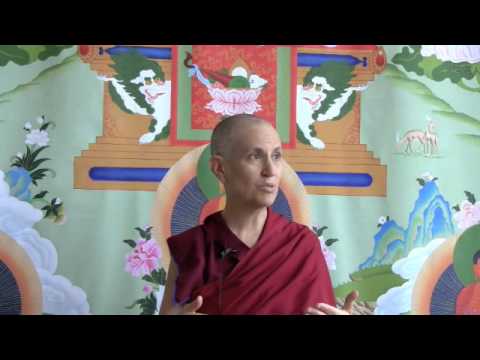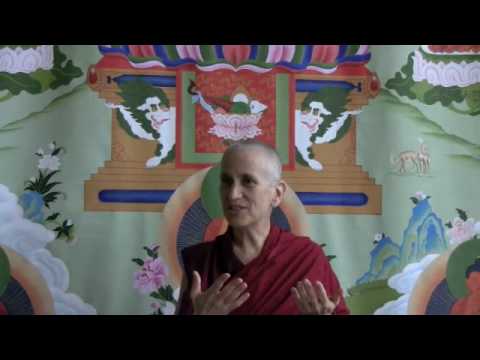Tara as resultant refuge
Tara as resultant refuge
Part of a series of Bodhisattva’s Breakfast Corner talks given during the Green Tara Winter Retreat from December 2009 to March 2010.
- Viewing Tara as the resultant refuge
- Why Tara should not be viewed as a god
Green Tara Retreat 006: Tara as resultant refuge (download)
The third way that you can see Tara is as the Buddha that we’re going to become. When we think about refuge, we think about causal refuge and resultant refuge. The causal refuge is the Buddhas, the Dharma and the Sangha that already exist. The resultant refuge is the one that we’re going to become. Then think of Tara. One way to think of Tara is that she is the resultant refuge, the Buddha that we’re going to become. In that way, when we see her we think that she embodies the body, speech, and mind of all of the Buddhas that we will also become.
This is a very nice way to communicate, so to speak, with the Buddha that we’re going to be. It is by visualizing Tara that helps us to remember that we, too, can become a Buddha and will become a Buddha one day. This way of thinking about Tara can be very encouraging to us. All of these three ways that I’ve been talking about [in the last three days], try to include them in your meditation. They have different purposes and functions. Depending upon what your mind thinks, what way of thinking will benefit your mind most at any particular moment, then think of Tara in that way.
It is important to remember that Tara is not God. I say this rather frequently because we often grow up in a theistic religion and then come into Buddhism. Then we impute the qualities of God onto Tara, and they aren’t the same. Tara is not a creator. She did not create the universe. It’s our own mind, our karma, that creates our situation. Tara did not invent the law of causality. Rather the Buddha (Tara) just describes how things naturally function. The same way that the Buddha or Tara didn’t invent karma, Newton didn’t invent gravity. He just described how it functions.
Thus Tara does not judge us, and does not dish out rewards and punishments. I think this is especially important to really think about again and again so that when we think of Tara, we relate to her in a proper way. Instead of reverting back to being six years old in Sunday school, with that kind of elementary understanding that we got of God, we don’t project that onto anything Buddhist. Those kinds of ideas are very foreign to the way that we’re meditating.
Venerable Thubten Chodron
Venerable Chodron emphasizes the practical application of Buddha’s teachings in our daily lives and is especially skilled at explaining them in ways easily understood and practiced by Westerners. She is well known for her warm, humorous, and lucid teachings. She was ordained as a Buddhist nun in 1977 by Kyabje Ling Rinpoche in Dharamsala, India, and in 1986 she received bhikshuni (full) ordination in Taiwan. Read her full bio.


